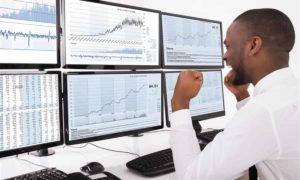Exploring the benefits of automated trading

In the fast-paced world of financial markets, automation has become an increasingly popular tool for traders seeking a competitive edge. Automated trading, also known as algorithmic trading, involves executing trades based on predefined strategies and rules, using computer programs. This trading method offers several benefits that can improve efficiency, mitigate risk, and potentially increase profits.
1. Access to advanced trading tools and technologies
Automated trading provides traders with access to advanced trading tools and technologies that can enhance their decision-making and execution capabilities. These tools often include advanced charting, technical analysis indicators, real-time data fees, and sophisticated risk management features.
By leveraging these tools within an automated trading system, traders can make informed decisions, identify trends, and capitalize on market opportunities.
2. Speed and accuracy
One of the main advantages of automated trading is that it can execute trades with lightning-fast speed and accuracy. Unlike human traders who can be prone to emotional bias and may take time to process information, automated systems can instantly analyze huge amounts of data, identify trading opportunities with momentum indicator tools, and execute trades almost instantly.
This efficiency and speed can be vital in markets where prices can change rapidly, ensuring that traders are able to swiftly enter or exit positions and potentially maximize profits or minimize losses.
3. Elimination of emotional biases
Emotions can play a huge role in trading decisions and may lead to poor judgment or irrational behaviour. Fear, greed, and overconfidence can cloud human judgment and result in trades that are impulsive or emotionally driven. Automated trading tools and systems eliminate these emotional biases by bringing objectivity and consistency to trading decisions.
They operated solely based on market conditions and technical indicators, removing the influence of human emotion from the decision-making process entirely and ensuring that trades are executed based on a systematic and well-defined approach. The result? Disciplined and consistent trading, increasing the potential for long-term success.
4. Backtesting and optimization
With automated trading, traders can backtest their strategies on historical data, allowing them to easily assess the performance and viability of their trading approaches. By simulating trades on past market data, traders can evaluate how their strategies would have performed in different market conditions.
This process can help with identifying strengths and weaknesses, allowing for optimization and refinement of trading strategies. With this information, traders are better positioned to fine-tune parameters, adjust risk management techniques, and enhance the overall effectiveness of their trading systems before deploying them in real-time trading.
5. Increased efficiency
Automated trading systems can monitor multiple markets, instruments, and timeframes simultaneously – something that would be a challenge for even the most dedicated of human traders to achieve. This multitasking ability allows traders to capitalize on numerous trading opportunities across different markets without missing out on potential profitable moves.
What’s more, automated systems can continuously scan the markets, execute trades, and manage positions around the clock, even when the trader is not physically present. This increased efficiency ensures that opportunities are not overlooked and that trades are executed promptly, even during non-trading hours.
6. Risk Management
Effective risk management is crucial in trading to protect capital and maintain a sustainable trading strategy. Automated trading systems enable traders to implement risk management rules with precision and consistency.
Traders can set predefined stop-loss orders, profit targets, and position sizing rules, ensuring that potential losses are limited and profits are protected. By automating these risk management parameters, traders can avoid making the wrong decisions during turbulent market conditions, reducing the risk of significant losses, and improving overall risk-adjusted returns.
7. Reduced transaction costs and slippage
Executing trades manually can often result in higher transaction costs due to delays and inefficiencies in order execution. Automated trading systems, on the other hand, can execute trades instantly and precisely, reducing overall transaction costs. Through the optimization of trade entry and exit points, automated trading helps traders capture the best prices available, resulting in potential cost savings over time.
This precision and efficiency are also essential when it comes to minimizing the impact of slippage. Slippage occurs when the actual execution price deviates from the expected price due to market volatility or delays in order processing. Manual traders may experience slippage when trying to enter or exist positions, particularly during high-volume trading periods or news events. However, the likelihood of slippage is greatly reduced when using automated trading systems, as they can swiftly respond to market movements and execute trades at the desired price levels.
From speed and accuracy to emotion-free decision-making, better risk management, and access to advanced tools, automated trading systems provide traders with a competitive edge. With the right approach and proper risk management, automated trading tools can be extremely valuable for traders looking to enhance their trading outcomes and stay ahead in the highly competitive world of financial markets.
Don't miss a thing. Follow us on Telegram and Follow us on WhatsApp. If you love videos then also Subscribe to our YouTube Channel. We are on Twitter as MakeMoneyDotNG.



